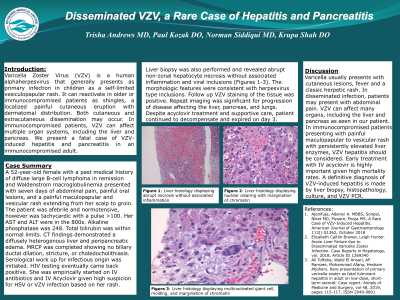Tuesday Poster Session
Category: Liver
P3888 - Disseminated VZV, a Rare Case of Hepatitis and Pancreatitis
Tuesday, October 24, 2023
10:30 AM - 4:00 PM PT
Location: Exhibit Hall

Has Audio

Trisha Andrews, MD
Riverside Medical Center
Kankakee, IL
Presenting Author(s)
Trisha Andrews, MD, Paul Kozak, DO, Krupa Shah, DO, Norman Siddiqui, MD
Riverside Medical Center, Kankakee, IL
Introduction: Varicella Zoster Virus (VZV) is a human alphaherpesvirus that generally presents as primary infection in children as a self-limited vesiculopapular rash. It can reactivate in older or immunocompromised patients as shingles, a localized painful cutaneous eruption with dermatomal distribution. Both cutaneous and extracutaneous dissemination may occur. In immunocompromised patients, VZV can affect multiple organ systems, including the liver and pancreas. We present a fatal case of VZV-induced hepatitis and pancreatitis in an immunocompromised adult.
Case Description/Methods: A 52-year-old female with a past medical history of diffuse large B-cell lymphoma in remission and Waldenstrom macroglobulinemia presented with seven days of abdominal pain, painful oral lesions, and a painful maculopapular and vesicular rash extending from her scalp to groin. The patient was afebrile and normotensive, however was tachycardic with a pulse >100. Her AST and ALT were in the 800s. Alkaline phosphatase was 248. Total bilirubin was within normal limits. CT findings demonstrated a diffusely heterogenous liver and peripancreatic edema. MRCP was completed showing no biliary ductal dilation, stricture, or choledocholithiasis. Serological work up for infectious origin was initiated. HIV testing eventually came back positive. She was empirically started on IV antibiotics and IV Acyclovir given high suspicion for HSV or VZV infection based on her rash.
Liver biopsy was also performed and revealed abrupt non-zonal hepatocyte necrosis without associated inflammation and viral inclusions (Figures A-C). The morphologic features were consistent with herpesvirus type inclusions. Follow up VZV staining of the tissue was positive. Repeat imaging was significant for progression of disease affecting the liver, pancreas, and lungs. Despite acyclovir treatment and supportive care, patient continued to decompensate and expired on day 3.
Discussion: Varicella usually presents with cutaneous lesions, fever and a classic herpetic rash. In disseminated infection, patients may present with abdominal pain. VZV can affect many organs, including the liver and pancreas as seen in our patient. In immunocompromised patients presenting with painful maculopapular to vesicular rash with persistently elevated liver enzymes, VZV hepatitis should be considered. Early treatment with IV acyclovir is highly important given high mortality rates. A definitive diagnosis of VZV-induced hepatitis is made by liver biopsy, histopathology, culture, and VZV PCR.

Disclosures:
Trisha Andrews, MD, Paul Kozak, DO, Krupa Shah, DO, Norman Siddiqui, MD. P3888 - Disseminated VZV, a Rare Case of Hepatitis and Pancreatitis, ACG 2023 Annual Scientific Meeting Abstracts. Vancouver, BC, Canada: American College of Gastroenterology.
Riverside Medical Center, Kankakee, IL
Introduction: Varicella Zoster Virus (VZV) is a human alphaherpesvirus that generally presents as primary infection in children as a self-limited vesiculopapular rash. It can reactivate in older or immunocompromised patients as shingles, a localized painful cutaneous eruption with dermatomal distribution. Both cutaneous and extracutaneous dissemination may occur. In immunocompromised patients, VZV can affect multiple organ systems, including the liver and pancreas. We present a fatal case of VZV-induced hepatitis and pancreatitis in an immunocompromised adult.
Case Description/Methods: A 52-year-old female with a past medical history of diffuse large B-cell lymphoma in remission and Waldenstrom macroglobulinemia presented with seven days of abdominal pain, painful oral lesions, and a painful maculopapular and vesicular rash extending from her scalp to groin. The patient was afebrile and normotensive, however was tachycardic with a pulse >100. Her AST and ALT were in the 800s. Alkaline phosphatase was 248. Total bilirubin was within normal limits. CT findings demonstrated a diffusely heterogenous liver and peripancreatic edema. MRCP was completed showing no biliary ductal dilation, stricture, or choledocholithiasis. Serological work up for infectious origin was initiated. HIV testing eventually came back positive. She was empirically started on IV antibiotics and IV Acyclovir given high suspicion for HSV or VZV infection based on her rash.
Liver biopsy was also performed and revealed abrupt non-zonal hepatocyte necrosis without associated inflammation and viral inclusions (Figures A-C). The morphologic features were consistent with herpesvirus type inclusions. Follow up VZV staining of the tissue was positive. Repeat imaging was significant for progression of disease affecting the liver, pancreas, and lungs. Despite acyclovir treatment and supportive care, patient continued to decompensate and expired on day 3.
Discussion: Varicella usually presents with cutaneous lesions, fever and a classic herpetic rash. In disseminated infection, patients may present with abdominal pain. VZV can affect many organs, including the liver and pancreas as seen in our patient. In immunocompromised patients presenting with painful maculopapular to vesicular rash with persistently elevated liver enzymes, VZV hepatitis should be considered. Early treatment with IV acyclovir is highly important given high mortality rates. A definitive diagnosis of VZV-induced hepatitis is made by liver biopsy, histopathology, culture, and VZV PCR.

Figure: Figure A: Liver histology displaying abrupt necrosis without associated inflammation
Figure B: Liver histology displaying nuclear clearing with margination of chromatin
Figure C: Liver histology displaying multinucleated giant cell, molding, and margination of chromatin
Figure B: Liver histology displaying nuclear clearing with margination of chromatin
Figure C: Liver histology displaying multinucleated giant cell, molding, and margination of chromatin
Disclosures:
Trisha Andrews indicated no relevant financial relationships.
Paul Kozak indicated no relevant financial relationships.
Krupa Shah indicated no relevant financial relationships.
Norman Siddiqui indicated no relevant financial relationships.
Trisha Andrews, MD, Paul Kozak, DO, Krupa Shah, DO, Norman Siddiqui, MD. P3888 - Disseminated VZV, a Rare Case of Hepatitis and Pancreatitis, ACG 2023 Annual Scientific Meeting Abstracts. Vancouver, BC, Canada: American College of Gastroenterology.
